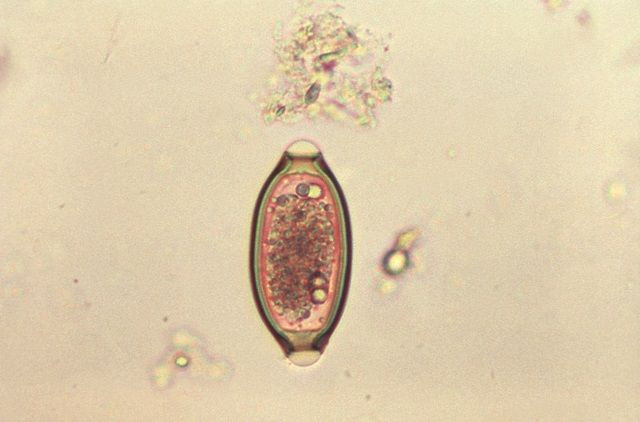Parasitic Worms May Restore Balance To Gut Microbiome In People With Crohn's Disease

A worm in the gut may help people living with certain types of Crohn’s disease get out of their rut, suggests a new study published Wednesday in Science.
The authors recruited laboratory mice to help explain a persistent mystery of the human gut: Areas of the world where parasitic worm infections are commonplace tend to have much lower rates of autoimmune disorders like Crohn’s and other inflammatory bowel diseases. Understanding how that connection works may help us put our parasitic freeloaders to good use or even devise worm-free ways to treat Crohn's.
The researchers gave specially bred mice lacking Nod2, a gene implicated in some Crohn’s cases, a non-steroidal anti-inflammatory drug that sent their small intestines into disarray and caused a chronic Crohn’s-like inflammation. More specifically, the mucus layer of the small intestine thinned, which seemingly decreased levels of a bacterial family called Clostridiales and increased levels of another common microbe, Bacteroides vulgatus.
Once these mice were infected with the mouse whipworm, though, mucus production picked back up, the levels of B. vulgatus declined as the levels of Clostridiales rose, and inflammation dropped off. A second worm, the nematode Heligmosomoides polygyrus, proved even more effective. And researchers saw a similar effect when they let worm-infested mice live with their uninfected counterparts. After further inspection, the authors concluded the worms had induced a specific immune response known as type 2 immunity, which jumpstarted mucus production and subsequently restored bacterial balance.
“We believe we found one explanation as to why people with parasite infections tend not to develop inflammatory disease,” senior study author Dr. Ken Cadwell, an assistant professor at the Skirball Institute of Biomolecular Medicine at New York Uuniversity, told Medical Daily. “Because we’re getting a glimpse as to how the immune response to parasite infection prevents inflammatory disease, we can now start to ask how we can get this same response and restore a balance in the gut without needing the parasite itself.”
The study only adds further support to the team’s earlier research on a Malaysian village where worm infestation is nearly universal. Back then, they studied the stool samples of people before and after they underwent a deworming treatment, finding that the levels of a related species to B. vulgatus rose significantly as the levels of Clostridiales declined once the worms were gone. Coupled with the present study, that suggests Clostridiales acts as a direct buffer against bacteria belonging to the Bacteroidales family; a sort of microscopic see-saw that can manually be pushed down by intestinal worms.
As the researchers explained, though, Crohn’s is a complicated disease caused by an array of genetic and environmental factors. Though the basic principle is the same — a chronic inflammation at the end of our small intestine caused by a hyperactive immune system — why that happens can dramatically vary from person to person.
According to Cadwell, about a third of Crohn’s sufferers have a defective Nod2 mutation and Bacteroidales seems to overly provoke the immune system only in these cases. Similarly, the paper suggests worms may only have a protective effect in people with the mutation, a theory that might explain why clinical human trials using them to treat Crohn’s have failed so far. And while an overabundance of B. vulgatus has been found in the guts of Crohn’s patients, it’s not the only type of bacteria that’s been tied to the disease’s emergence.
“We and others believe that no single bacteria ‘causes’ Crohn’s disease, but the imbalance in the [gut bacteria] population is what contributes to the disease,” he said. “That’s why the field is now interested in ways to restore the balance, either by giving people protective bacteria or inducing a protective immune response.”
For their part, Cadwell and his colleagues are eager to contribute to that goal. “We figured out a lot about how the parasite infection promotes the expansion of beneficial Clostridiales species, but we still don’t know exactly how Clostridiales suppresses the inflammatory Bacteroides and restores balance,” he said. “That’s what we want to tackle next.”
According to the Crohn’s and Colitis Foundation of America, 700,000 Americans are currently afflicted with the manageable but as yet incurable condition.
Source: Ramanan D, Bowcutt R, Lee SC, et al. Helminth Infection Promotes Colonization Resistance via Type 2 Immunity. Science. 2016.



























